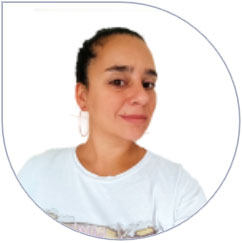Focus
Women’s Prize for Journalism
Submissions came in from contributors, beneficiaries and partners in a range of countries and covered topics including human rights abuses, corruption and conflict.
The submissions were considered by an award panel comprised of Lady Primrose Bell, a former journalist with a long association with IWPR, Antonia Cundy, a special investigations reporter with the Financial Times and Tanya Hassan, IWPR Global Director of Development.
"What was significant for all three of us was how the stories stayed with us - not just for the amazing yet harrowing insights into these women’s lives but the courage it took for them to keep going, to experience the harshness in which they lived and to tell the world about it through their stories…We are committed to ensuring this award continues to amplify the voices of many women in conflict and repression around the world."
The winners receive a first prize of 1,500 US dollars, with two runner-up prizes of 500 dollars each. A further two entrants received Special Mentions and a prize of 250 dollars each.
From the judges:
"This was a fantastic investigative journalism series that was unflinching in uncovering the horrors of this harsh reality, finely balanced and based on meticulous research."

Migrating and Vanishing
There’s no exact data on the number of migrants that go missing in Central America, Mexico and the United States on the perilous journey to the American dream. Their remains and belongings are kept in cardboard boxes in a U.S. morgue, hidden in the desert or buried with no name in a distant cemetery from their homeland. But their lives are not forgotten by families that search for the remains of their loved ones with the support of non-governmental organizations.
This investigative series was produced by an international team of journalists reporting across Guatemala, Mexico and the U.S. It sheds light on the untold stories of migrants who have vanished and uncovers an undercount of the missing by governmental institutions that fail at assisting in the search and providing answers to the families, often leaving a state of interrupted mourning.
Words by Verónica Liso, Rosario Marina and Gabriela Villegas. Images by Andrea Godínez.
 Verónica Liso FREELANCE INVESTIGATIVE JOURNALIST |  Rosario Marina JOURNALIST |
 Gabriela Villegas JOURNALIST & DIGITAL CONTENT EDITOR |  Andrea Godínez PHOTOJOURNALIST |

But Who Can Hear You in the Desert?
In one Arizona morgue alone in the U.S. there are more than 300 unidentified remains of migrants. Their bones and belongings sit in cardboard boxes in a nondescript trailer in a parking lot.

Interrupted Mourning
There is no unified mechanism for cross-referencing the DNA of searching families with the remains awaiting identification in U.S. morgues. So who identifies them and how?

Twice Disappeared
Overcrowded morgues and underreporting in Mexico's national database of missing persons.

Searching for Answers
Lack of data and discrimination: Mexican authorities fail in the search for missing migrants.
From the judges:
"A well-researched report uncovering the disturbing rise and victim blaming of women being killed with seeming impunity."

Femicide in Uzbekistan
In the absence of official statistics, data analysis reveals shocking extent of gender-related murders.
 | Louisa Atabaeva FREELANCE JOURNALIST COVERING UZBEKISTAN |
On June 13, 2020, a resident of Namangan killed his wife with an axe during an argument. He then attacked his three young daughters, murdering the four-month-old baby, before killing himself. This is femicide.
On June 4 2022, in a village in Fergana province, a father found out that his 16-year-old daughter had gone on a date and repeatedly hit her on the head until she lost consciousness. The father ordered her not to speak to the boy again. The girl subsequently died of her injuries; her father was charged with grievous bodily harm resulting in death. This is femicide.
From the judges:
"An honest and thoughtful account of the lengths midwives and doctors must go through to simply work and help others. Heartbreaking personal stories combined with excellent research and statistics."

The Taleban’s Deadly Toll on Women Midwives and Doctors
Medical personnel struggle to do their jobs - and patients suffer - under increasingly draconian rules.
Published in Zan Times, by Sana Atef, Mehsa Elham and Freshta Ghani.
Humaira*, a single mother-of-three, is a midwife in a hospital in Kandahar province. But each time the Taleban adds another layer of edicts directed at working women, it makes it harder for her to continue helping others navigate the dangers of childbirth in a country with a shockingly high rate of maternal mortality.
Her experience is echoed across Afghanistan as female medical personnel struggle to do their jobs under increasingly draconian rules directed at them because of their gender.
From the judges:
"An engaging account of how life has changed for women in Iraq, told through the practical lens of women’s apparel from 1973 to the present day. Wonderful storytelling highlighting harsh reality."
From the judges:
"An insightful and courageous account of the reach of guerilla horror in Colombia. Compelling reading."

Lady Primrose Bell
A former journalist with a long association with IWPR

Antonia Cundy
Special investigations reporter, Financial Times

Tanya Hassan
Global Director of Development, IWPR
"What a worthwhile project it has been and I am sure it will go from strength to strength."
"The IWPR’s Women’s Journalism Award is an inspiring celebration of the strong and urgent journalistic voices supported by IWPR’s work."
"We are committed to ensuring this award continues to amplify the voices of many women in conflict and repression around the world."

